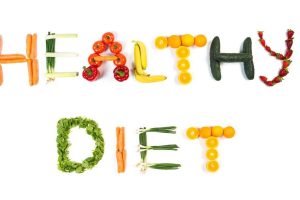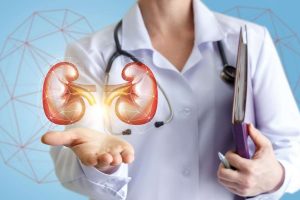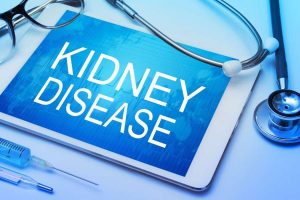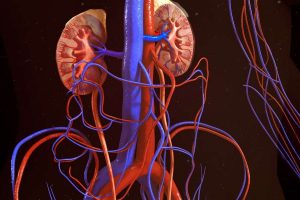The kidneys, of which most people have two, have several functions in addition to eliminating your body of waste products and excess fluid. The kidneys produce urine, which removes excess body fluid and waste products. Seems pretty simple, right?
Well, the process by which urine is produced is a complex series of events necessary to keep the body’s chemicals in proper balance. Proper kidney functions are vitally essential to your overall health and well-being.
The National Kidney Foundation® provides helpful information the average person can understand. Let’s have a glimpse at some fundamental facts about what kidneys do and what can happen when proper kidney function is compromised.
Elimination of waste products and excess fluid is just one of the many roles the kidneys have in the human body. They also regulate the body’s amount of salt, acid content, and potassium, and the kidneys produce hormones that affect how other organs in the body function.
Hormones produced by the kidneys stimulate the production of red blood cells, keep blood pressure regulated and help in the control of calcium metabolism. Serious, even life-threatening, kidney problems may develop if you do not monitor the health of these vital organs.
Basic Overview of How Kidneys Work
Each of your kidneys is the size of a human fist. They are located on at the lowest edge of the rib cage on either side of the spine. Each kidney has millions of units called “nephrons,” and each nephron has a glomerulus (a unit of tiny blood vessels) attached to a tubule.
When blood reaches the glomerulus, it is filtered, and the remaining fluid passes along the kidneys’ tubules. While in the tubules, water is added or extracted according to your body’s needs, and the final product is the urine we pass.
Why are kidneys so important to our health? Kidneys perform life-sustaining functions if they don’t work properly, our bodies will not be relieved of dangerous toxins.
Poor kidney function can lead to:
- Diabetes
- Hypertension
- Heart attack
- Scarring of the kidneys
- Inflammation of the kidneys
- Urinary incontinence
- Urinary tract infections (UTI)
- Stroke
- Polycystic kidney disease
- Kidney stones
- Kidney failure
Early Detection to Prevent Serious Kidney Problems
There are simple tests that can detect kidney problems before they escalate to the dangerous level. Frequent blood pressure checks will help to monitor the possibility of kidney issues. A urinalysis can also detect too much protein in the urine an excess amount of protein in the urine means your kidneys are not filtering properly.
Testing your creatinine level in your blood can also help detect early kidney malfunction. Knowing the risk factors for kidney disease is very helpful to preventing kidney disease, so be sure to provide your physician with a thorough medical history.
You may have an increased risk of kidney problems if you:
- Are over the age of 50
- Have diabetes
- Have hypertension
- Have a family history of renal problems
- Are of African-American descent
- Are of Hispanic descent
- Are of Asian descent
- Are of Pacific Islander descent
Kidney functions, particularly as you age and have a family history of renal disease, must be carefully monitored to help prevent renal malfunction or failure. Speak to your physician about the health of your kidneys and see what preventative measures you can take now to minimize your chances of developing renal problems later.
Symptoms and Diagnosis
Signs differ on the cruelty of the kidney failure, its rate of progression and its underlying cause. The symptoms of acute renal failure (ARF) also known as acute kidney disease include:
- Fluid retention
- Internal bleeding
- Confusion
- Seizures and coma
A patient with kidney disease may not have any symptoms until normal kidney function declines to 20 percent or less. Various of the signs of kidney disease relate symptoms from other illnesses.
If not checked out properly the wrong diagnosis for the problem can be given leading to you receiving treatment that was inappropriate. This could prolong the suffering, damage, and cost of treatment, so it is important to seek medical attention early if you are concerned.
Effects and signs of kidney disease comprise:
- Want to urinate constantly, particularly at night;
- Vomiting and nausea;
- Metallic flavor;
- Pale skin
- Headaches and;
- Tingling
How to Prevent Chronic Kidney Disease
If you have healthy kidneys, you can protect them and prevent yourself from developing kidney problems. Following a few simple guidelines can help you achieve this aim.
- Eat a healthy diet
- Drink a lot of water → A Great Drink for Kidney Health
- Pay careful attention to use of over-the-counter medication(s) (particularly when combined with prescription medication or other over-the-counter products)
- Consume alcohol responsibly (over-the-counter or prescription drugs can be very damaging to the kidneys when combined with alcohol)
- Protect kidneys from sports-related injury,
- Consider taking protective supplements and nutrients to support overall kidney health.
- See your physician regularly
- Follow prescribed dietary and drug treatment to control blood sugar and
- blood pressure levels
- Prevent kidney stones by increasing water intake to 12 full glasses daily
- Limit caffeine (e.g., coffee, tea, and colas) because it increases fluid loss
- Increase dietary calcium and include appropriate calcium/magnesium supplementation (taken only with food).
- Request creatinine and blood urea nitrogen (BUN) be checked, along with urine protein levels as part of an annual physical.
If you have early stage of kidney disease, follow the dietary recommendations of your physician or renal dietitian and have regular check-ups. If you have a close relative or friend, who falls into any of the categories that make them more likely to develop chronic kidney disease you should advise them to get their kidney function checked as soon as possible as well.
If you are experiencing problems or symptoms, that may be associated with kidney disease you should also seek medical attention early. Inform your doctor of all the symptoms you are experiencing and where possible give them as much information about:
- When the symptoms started
- Whether there is any particular time of day when the symptoms are worse
- Whether there is any activity that causes more pain or distress or makes the symptoms worse
- Any medications you may be taking
- Any illnesses you may be suffering from and
- If you have any family members with a history of kidney disease or a disease known to make it more likely to develop kidney disease.
Seeking medical attention early can mean the difference between life and death in some cases. However, in most cases, it may mean the difference in the quality of life. Knowing when to seek medical attention is the key.
Kidney Diet
If you are one of the many people in the US that have kidney problems- you should be adjusting your dietary habits to follow a healthy renal meal plan. There are a variety of alternative kinds of kidney food plans available, each one specific to a particular kidney issue.
You can get a plenty of knowledge on the various types of kidney problems on the internet and from your health provider.
However, regardless of your type of kidney disease, proper nutrition is vital in surviving renal issues. Annually the number of Americans that develop renal conditions increases, and unfortunately, many of these cases could have been avoided with proper nutrition.
Finding The Best Kidney Diet Plan
It’s not very often that renal issues occur overnight unless it’s caused by some other extreme external factors such as blood loss, severe dehydration or coronary attack. On the contrary, renal function tends to degenerate over a period, months or even years.
Hence, This is why it is so necessary to act as soon as you suspect renal concerns so that you can prevent the progression of kidney disease to critical levels. Not only will early identification allow you to change negative eating habits that may be contributing to the disease, but you can also start proper renal nutrition and treatment to alleviate the effects of the disease.
When renal conditions are discovered soon enough, and the best program of diet, nutrition, and other medical care is started, you can vastly reduce the amount of damage your organs suffer as a result of your issues, and you may even be able to control your disease.
In some cases, it is even possible to stop or reverse your condition and improve kidney function. However, if you wait until your kidney disease progresses to the later stages, your treatment options will be severely limited.
A natural way to keep your renal system healthy is by adhering to a kidney diet and learning which foods can benefit or negatively affect your issues. And in most cases, adhering to a kidney diet is not that hard and may not require significant lifestyle changes.
One of the simplest alterations to make is to drink more water to keep your body hydrated which helps prevent kidney stones which can lead to possible renal damage. In no time you will start to see positive results from your healthy kidney diet!
Why Do You Need A Kidney Diet
Exactly what is a kidney diet regime and why is this diet plan needed? Kidney ailment or injury could cause issues with kidney function, and a special diet is prescribed to make certain that the kidneys don’t become damaged or have impaired functionality.
This diet includes foods which should be eaten and those that should be prevented altogether. The foods are chosen so that kidney health and function are improved, and there’s less stress on the kidneys.
Without a specific diet individuals with kidney damage or kidney disease may need dialysis and other medical treatment plans. The best diet will restrict the amount of kidney functionality required, and minimize the stress and work needed by these internal organs. This assists to lessen signs and symptoms and can prevent dialysis from being required.
When a proper dieting designed for optimal kidney health isn’t adopted, then the kidneys may not be able to remove waste from the body efficiently. The effort required to clear body wastes could cause the kidneys to fail wholly or result in more organ destruction.
A kidney diet is typically recommended at any time ailment or damage afflict the kidneys. Kidney failure can result in death, but the healthy diet can prevent this disorder in so many cases, and make sure that the kidneys start performing more efficiently again. This kind of diet will also minimize the damage done to the organs.
If kidney disease, damage or severe injury is diagnosed the physician will suggest an appointment with a dietician. The diet professional will look at the condition that is causing destruction or function problems and then figures out an excellent diet regime specifically for the individual.
This will usually include many queries about food preferences as well as a listing of foods to prevent. A diet plan will be developed to make sure that all dietary needs are met utilizing foods that market kidney health and performance.
When a kidney diet is advised, it is crucial to follow this diet very tightly.
Living with Kidney Disease
If you are already diagnosed with kidney disease, you can still have a good quality life. In fact, most people diagnosed with kidney disease can lead active, interesting and fulfilling lives which involve jobs, sport, and varied social activities.
The key to living such fulfilling lives for many people with kidney disease has been a program of physical exercise and rehabilitation planned with the help of doctors, nurses and dieticians, etc. who specialize in working with persons with kidney disease.
Rehabilitation would include the restoration of your emotional and psychological well-being, your ability to adjust socially and your physical health so you are able to perform certain tasks and meet the demands of your employment.
Your progress will depend on the stability of your medical condition, your motivation, your desire to learn and your beliefs about yourself and your ability to get through what may seem like a difficult task.
A physical exercise program, when incorporated into your total treatment plan, can be extremely beneficial to your general physical and mental health.
Benefits to your physical health can include:
- Weight loss
- Improved muscle strength
- Lower cholesterol levels
- Lower blood fat levels
- Increased amount of red blood cells
- Increased cardiac output
- Increased energy
- Improved sleep
- Lower risk of heart disease
Benefits to your mental/psychological health can include:
- Enhanced feelings of self-esteem
- Increased sense of independence
- Decreased feelings of depression and anxiety as serotonin levels increase
Regular exercise is tremendously important for people with end-stage kidney disease. You must be careful to follow a few simple rules to ensure you don’t hurt yourself.
- Design the exercise program to fit your own physical capabilities.
- Consult your doctor before beginning any exercise program
- Follow your doctor’s instructions
- Make sure to comply with your medication and dietary instructions
- Integrate your exercise regime into your lifestyle – this might be a bit tricky if you are undergoing dialysis but it can be done with some creative thinking and adjustment
- Make it fun and interesting
When designing your exercise program you should consider the following:
- Walking, swimming, cycling, skiing or aerobic dancing
- Exercise 3 to 5 days per week
- Aim for 30 minutes per session
- Start with 5 minutes and build up gradually over time
- Begin each session with a slow warm up
- Rise to a comfortable level
- Slow down again before you finish
- Don’t make your session too intense – you should feel completely recovered within one hour and you shouldn’t feel so sore you are unable to exercise the following day
- Be patient and don’t give up
Other ways of improving kidney disease
- Regular physical activity and exercise are an important part of well-being. It gives your body a chance to work the way it should. Benefits include:
- More oxygen going to the body
- Relaxing from deep breathing
- Help with sleeping problems
- More strength and endurance
- Better blood flow or circulation
- Possible increase in the oxygen-carrying capacity of red blood cells (hemoglobin)
- Improved appetite, digestion, and bowel function
- Stronger lungs and heart (from aerobic exercise) that work more effectively and efficientl
Activity can be a regular, planned exercise program such as those offered through health clubs, community centers, or a local “Y.” You can also plan your own exercise program around such things as walking, swimming, aerobic exercise, rowing, and cycling; dancing, gardening, golfing, or playing catch also help keep your body active and your life in good balance.
Check out the “No Dialysis Needed” program is a step-by-step treatment program which helps improve your kidneys naturally, without the use of unnatural man-made pharmaceutical drugs.
From time to time you may feel discouraged especially in the early days but you usually begin to feel better within a few weeks or months of starting treatment. As you feel better, a good kind of “snowball” effect starts to take place. You’ll feel more able to cope with your problems.
You gain a new outlook and a more positive and accepting attitude. You can still expect to have times when you feel down and depressed, but usually these feelings happen less often and last for a shorter length of time.










